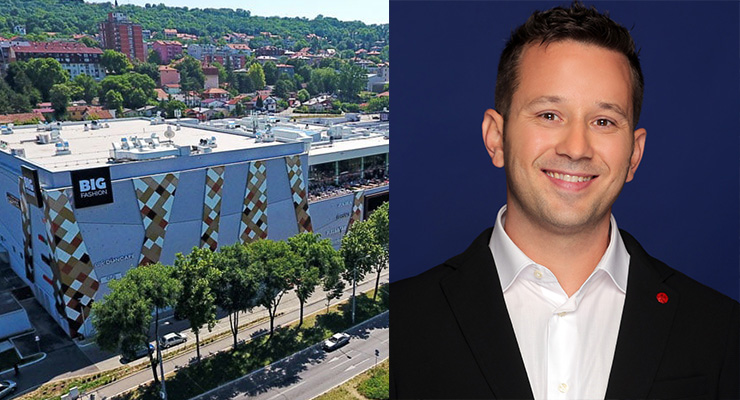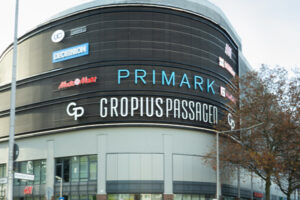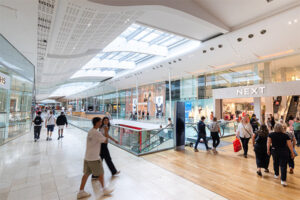Interview conducted by: Anne-Kathrin Velten
ACROSS: MR. WEISS, FOR READERS WHO MAY NOT YET BE FULLY FAMILIAR WITH BIG, COULD YOU START BY OUTLINING THE COMPANY’S IDEA AND VISION FOR THE BALKANS?
LEV WEISS: From the very beginning, the vision has been clear: to build a strong, recognizable, and trusted retail real estate brand. We don’t see ourselves merely as developers or financial investors. We are operators of shopping centers, committed to long-term brand equity and consistency.
The guiding idea is simple: When someone thinks about shopping in Serbia, Montenegro, or elsewhere in the region, they should immediately think of BIG. We want BIG to be the first association for high-quality, accessible, and enjoyable shopping.
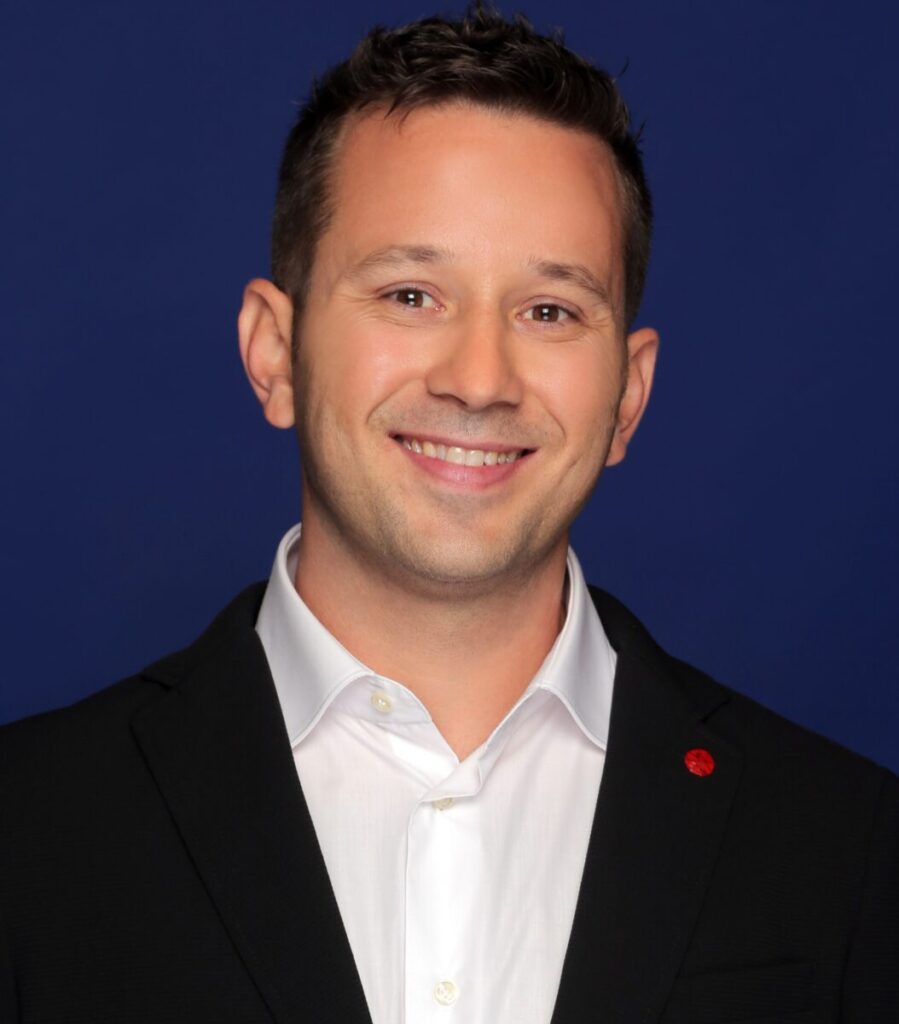
Lev Weiss
CEO of BIG CEE
ACROSS: SO, MARKETING HAS BEEN A PRIORITY SINCE THE BEGINNING.
WEISS: That is why we put enormous effort into brand marketing and positioning. Our centers are always marked with the distinctive, red BIG logo and the iconic totems that make them visible from afar. We want customers to be assured that no matter which BIG center they visit, they will experience consistent quality in design, tenant mix, cleanliness, and customer service.
At the same time, we do not wish to impose a cookie-cutter model. While consistency of standards is crucial, we also localize our projects. Every city or catchment area has different needs, and we adapt accordingly. That balance between local relevance and strong overarching brand identity is central to our philosophy.
ACROSS: YOUR COMPANY HAS RAPIDLY GROWN TO BECOME THE LARGEST RETAIL OPERATOR AND DEVELOPER IN SERBIA AND MONTENEGRO. WHAT HAVE THE KEY MILESTONES BEEN ON THAT JOURNEY?
WEISS: One of the earliest milestones was our entry into Serbia at a time when the market was almost untouched by modern retail. When Serbia opened up to foreign investment, we recognized the huge gap in supply: almost no square meters of organized, Western-style shopping existed per capita. That was a unique opportunity.
From there, we expanded step by step, gradually building trust with tenants, banks, and consumers alike. Our resilience during the COVID-19 crisis marked the second milestone. We were the first in Serbia to announce rent relief. That not only helped our tenants survive but also solidified long-term partnerships. We strongly believe in being there for our tenants in times of need, and we were able to prove that during the pandemic.
Another major highlight was the acquisition and rebranding of Promenada in Novi Sad. Today, it operates as BIG FASHION Novi Sad, and it stands among the flagship malls in the country. Adding such a prominent asset under the BIG umbrella was a decisive move.
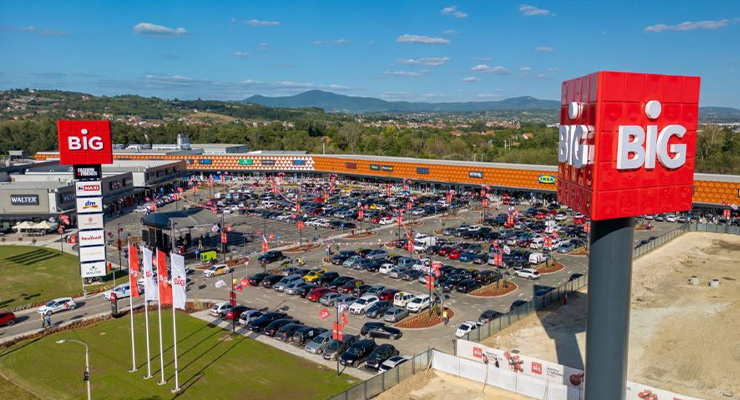
Finally, this year represents a historic moment for us: For the first time, we are opening three retail parks within just two months – in Čačak, Šabac, and Bor. Not only is this a logistical achievement, but it is also a clear statement of how deeply we are embedded in the Serbian market.
ACROSS: WITH SO MUCH ALREADY ACHIEVED, HAVE THE COMPANY’S GOALS BEEN FULFILLED, OR SHOULD WE EXPECT FURTHER EXPANSION?
WEISS: We are absolutely still in a growth phase. In Serbia, we already cover nearly the entire country. While there may be room for more projects, the main potential now lies in the optimization and expansion of existing centers and in new markets. In Montenegro, for example, we own the best shopping mall in Podgorica, which is performing quite well, and we are planning a major 20,000 sq m expansion that will bring the total size to nearly 50,000 sq m. Once the project is completed, Montenegro will have one of the most modern shopping malls in the region. We have also purchased The Capital Plaza, a unique mixed-use project in Podgorica, and land in Nikšić for a retail park. We are also actively looking for new opportunities.
Beyond that, Albania is a key focus. We have a joint venture with Balfin Group, the country’s leading retail player, to develop retail parks there. Albania is one of the fastest-growing markets in the region, and together we can leverage our local expertise with our strong tenant relationships, brand awareness, and operational know-how.
So, in short, Expansion is definitely ongoing, but it is always strategic, not opportunistic. We only enter markets in which we can build the entire BIG story.
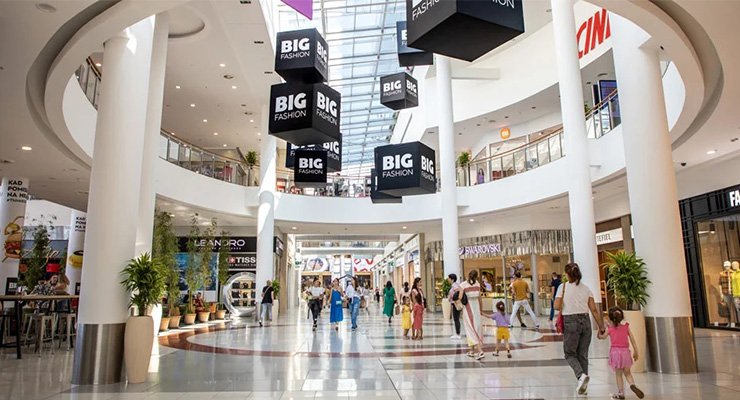
ACROSS: BIG CURRENTLY OPERATES 13 RETAIL PARKS, WITH ONE MORE TO OPEN IN MID-NOVEMBER. WHAT MAKES YOUR RETAIL PARKS UNIQUE?
WEISS: Firstly, for us, the Excel spreadsheet always comes last. We don’t start with yield calculations: We start with the quality of the center, its design, tenant mix, marketing, and brand positioning. We have a very hands-on approach, and we put huge efforts into maintaining the highest possible standards at our centers. We put extra focus on the number of parking spots, on detailed cleaning, and on creative and well-maintained green areas. Secondly, we invest heavily in national brand campaigns. We sometimes run BIG campaigns across prime-time television, connecting multiple centers under one theme. That kind of broad brand-building is rare among developers in the region. Thirdly, we are highly tenant-focused. We monitor tenant performance on a monthly basis across all centers, comparing effort ratios and sales per sqm. If something is off, we proactively approach tenants to provide them with marketing budget support, or to grant temporary rent relief. That culture of partnership has allowed us to lease and successfully operate centers in locations where others might struggle.
Finally, we see our retail parks as “lifestyle projects”. With the new openings in Čačak and Šabac, in particular, the design and tenant mix go far beyond the traditional retail park. We integrate strong F&B and entertainment components, dedicate smaller retail units suitable for higher fashion and jewelry brands, and create different designs for the street and facade – all of which are more akin to open-air shopping malls.
ACROSS: IN ADDITION TO RETAIL PARKS, BIG BALKAN ALSO OPERATES SEVERAL SHOPPING MALLS AS WELL AS SERBIA’S ONLY DESIGNER OUTLET. COULD YOU TELL US MORE ABOUT THE BIG FASHION BRAND?
WEISS: The BIG FASHION brand is our mall concept, currently represented by four shopping malls, including BIG FASHION Belgrade and the rebranded BIG FASHION Novi Sad. These malls offer a full-scale urban retail and leisure experience and are positioned as the most modern in their respective cities.
Then, there is BIG FASHION Outlet, the only designer outlet in Serbia. When we acquired it in 2019, it was underperforming. Since then, we have achieved 100% occupancy, increased footfall, and consistent turnover growth. That said, the outlet business in Serbia still faces structural challenges. Most brands are represented via local franchisees rather than directly by global headquarters. That makes true outlet pricing more difficult to implement. In Western Europe, customers expect direct parent-company contracts, as at Austria’s Parndorf, where Serbs often shop.
Nevertheless, I am confident this will change over time – just as Inditex once entered the region via franchisees and later came directly. Until then, we will continue to expand the mix and strengthen our position as the only designer outlet operator in Serbia. We have a few surprises in store in the near future.
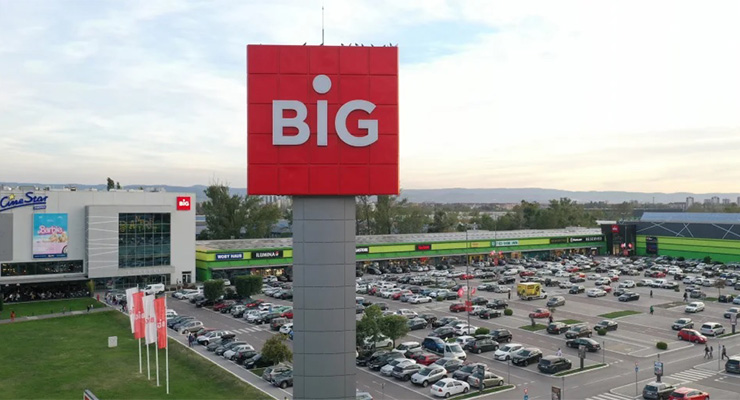
ACROSS: TURNING TO TENANTS: WHO ARE YOUR MOST SUCCESSFUL PARTNERS, AND WHICH BRANDS DO YOU FEEL ARE MISSING FROM THE MARKET?
WEISS: As our philosophy is very tenant-oriented, we have excellent partnerships with most of the local and international tenants. They are extremely professional and deliver strong results. However, there is still a vacuum in the market. Serbia is growing, purchasing power is rising, and yet some key international brands are absent. On my personal wish list, I would include Primark and Uniqlo. The cosmetics sector could also use more international players, such as Douglas, and I believe the H&M Group could expand with additional brands. The F&B sector also needs strengthening. While McDonald’s and KFC perform very well, the overall offer of international chains remains limited. There is a big opportunity for more concepts to enter, especially as F&B becomes an anchor of modern retail developments. Finally, entertainment concepts are still underrepresented. Shopping centers worldwide are becoming entertainment destinations, and Serbia is no exception. We see big opportunities in that area.
ACROSS: WHAT ARE THE MAIN CHALLENGES IN YOUR MARKETS, AND HOW DOES BIG DEAL WITH THEM?
WEISS: Every retail market has challenges. For us, some of the most pressing include:
- F&B capacity: As I mentioned, there are simply not enough strong operators to fill the potential, and we are actively working on attracting newcomers to the region.
- Cinema struggles: The global decline of cinemas after COVID-19 has also affected us, given their large footprint, and we are now adjusting sizes and working together with operators on optimizing the collaboration.
- E-commerce: While still relatively modest in Serbia, online shopping is growing. As card payments replace cash, we expect stronger e-commerce penetration. Our challenge is to ensure our centers remain attractive destinations beyond pure shopping – hence our focus on placemaking and leisure.
On the people side, retail is always a people business. Recruiting and training the right staff is not easy. We sometimes mentor small local retailers, helping them grow from a single street shop into a chain of 10 stores within our centers. This takes time and effort, but it pays off for both sides. Overall, our approach is proactive: We monitor data closely, work hand-in-hand with tenants, and constantly upgrade our centers to meet new expectations.
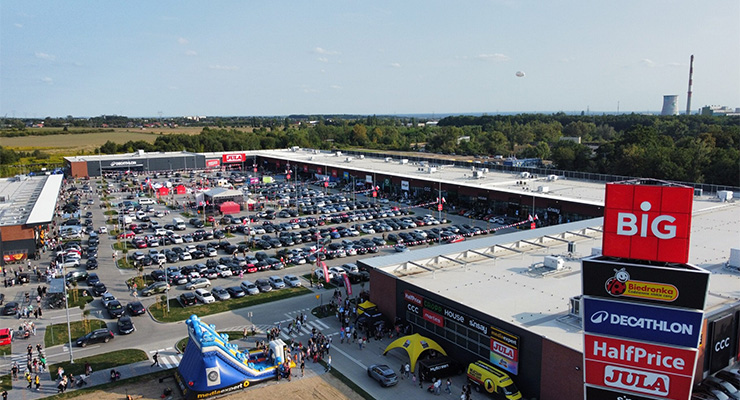
ACROSS: THE ENTERTAINMENT SECTOR HAS BECOME MORE IMPORTANT IN RETAIL REAL ESTATE. HOW IS BIG RESPONDING TO THIS TREND?
WEISS: Entertainment is no longer a “nice to have”; it has become central to the shopping experience. That is why our new projects are explicitly designed as lifestyle destinations, with large F&B zones, playgrounds, and event spaces. Even smaller regional retail parks now feature high-end restaurants and leisure concepts, proving that customers everywhere – not only in big cities – want more than just stores. Going forward, we plan to integrate more entertainment operators, both international and local, to ensure BIG centers remain vibrant community hubs. We also frequently provide entertainment to our visitors, at all of our centers, via large concerts, contests, festivals, and many more activities – always free of charge.
ACROSS: LOOKING AHEAD, HOW DO YOU VIEW THE OVERALL DEVELOPMENT OF THE MARKETS IN WHICH BIG OPERATES?
WEISS: The Balkans remain one of the most exciting retail frontiers in Europe. In contrast to Western Europe, which is saturated, there is still room for significant growth. Demographics are shifting, purchasing power is increasing, and modern retail formats are still expanding. Serbia and Montenegro will remain core markets, with additional projects and expansions. Albania will be the next growth story. Poland is already a stronghold for us, and we are open to new opportunities in surrounding countries if the business logic is right.
Our long-term ambition is to ensure that BIG becomes synonymous with shopping across Southeast Europe, with a consistent brand presence, trusted tenant partnerships, and centers that are more than just retail – they are destinations.
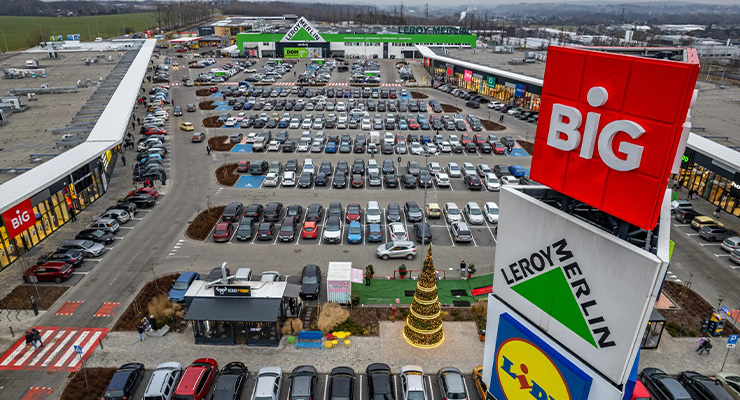
ACROSS: FINALLY, IF WE LOOK FIVE YEARS AHEAD, WHERE DO YOU SEE YOUR COMPANY?
WEISS: In five years, I see BIG, even more so than now, established as the number one shopping center operator across the Balkans, with strong footholds in Albania and Montenegro, further strengthened assets in Serbia, and selective expansion in neighboring markets. Beyond numbers and geography, my vision is that BIG will be a brand everyone knows and trusts – not only in Serbia but across the region. It’s a brand that conveys quality, convenience, leisure, and reliability.
That, ultimately, is what thinking big means to us.

